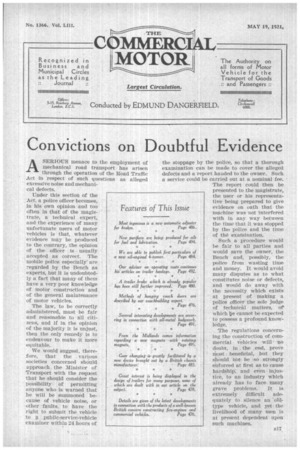Convictions on Doubtful Evidence
Page 35

If you've noticed an error in this article please click here to report it so we can fix it.
ASERIOUS menace to the employment of mechanical road transport has arisen through the operation of the Road Traffic Act in respect of such questions as alleged excessive noise and mechani cal defects.
Under this section of the Act, a police officer becomes, in his own opinion and too often in that of the magistrate, a technical expert, and the experience of many unfortunate users of motor vehicles is that, whatever evidence may be produced to the contrary, the opinion of the officer is usually accepted as correct. The mobile police especially are regarded by the Bench as experts, but it is undoubtedly a fact that many of them have a very poor knowledge of motor construction and of the general maintenance of motor vehicles.
The law, to be correctly administered, must be fair and reasonable to • all citizens, and if in the opinion of the majority it is unjust, then the only remedy is to endeavour to make it more equitable.
We would suggest, therefore, that the . various societies concerned should approach., the Minister of Transport with the request that he.should consider the possibility' of permitting anyone who is warned that he will be summoned because of vehicle noise, or other faults, to have the right to submit the vehicle to _a :.public7service-vehicle examiner within 24 hours of the stoppage by the police, so that a thorough examination can be made to cover the alleged defects and a report handed to the owner. Such a service could be carried out at a nominal fee.
The report could then be presented to the magistrate, the user or his representative being prepared to give evidence on oath that the machine was not interfered with in any way between the time that it was stopped by the police and the time of the examination.
Such a Procedure would be fair to all parties and would save the owner, the Bench and, possibly, ' the police from wasting time and money. It would avoid many disputes as to what . constitutes noise or defects, and would do away with the necessity which exists at present of making a police officer the sole judge of technical matters, of' Which be cannot be expected to' possess a profound know' ledge. • • The regulations concerning the construction of commercial vehicles -will---no doubt, in . the end, prove fiiost r beneficial, but they shoufd not be -so strongly enforced at first as to cause hardShiP; and even, injustice, to an industry Which already has to face many grave problems. It is extremely difficult adequately to silence an -oldtype vehicle, and yet the livelihoed of many men is at present dependent upon such machines. '




































































































